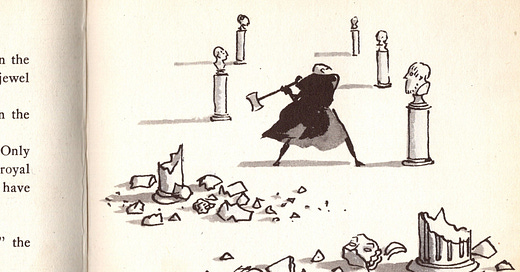Review : James Thurber, The Wonderful O. Illustrated by Marc Simont. New York: Simon and Schuster, 1957.
It’s an O. But it might have been an L, G, B, T or a Q. Even D, E, or I. A band of self-centered pirates take over a country with plans to strip it of its treasure. When met with disgust and recalcitrance, they decide as well to ban the letter O. After all, their logic runs, if there is treasure to be found and no letter O in the word treasure, then by tearing everything apart— even words and concepts — they can reduce all life to their own ruthless concept of value.
Naturally the gns find willing helpers: No o in judge and lawyer and fees and fines: rchestras, cncerts, harmny and meldy, peras, even scres are banned by rder f the Curt:
“What was the letter of the law [was] now the law of the letter.”
“The more chaotic the clarification… the better.”
Does this all sound familiar?
“Everything that had an O was opened, ransacked.”
“O-lessness was now a kind of cult.”
Familiar, yet?
“A man named Otto Ott, when asked his name, could only stutter. Ophelia Oliver repeated hers, and vanished from the haunts of men.”
As Jean-Paul Sartre argues, the oppressed are oppressed to the extent that their whole power of self-definition as human agents has been confiscated by forces outside themselves. The oppression of the oppressed can only take the shape of a denial of whatever constitutes a bourgeois affirmation of individual freedom.1
“Before they were through they had torn down colleges and destroyed many a book and tome and volume, and globe and blackboard and pointer, and banished professors, assistant professors, scholars, tutors and instructors. […] Babies often made as much sense as their fathers.”
And yet. As every baby intuits—kids as well—it’s when we traverse sense-making in every sense that sense is made of the sensual. As G. W. F. Hegel put it,
“The True is the Whole. The Whole, however, is whole only by expanding.”
„Das Wahre ist das Ganze. Das Ganze aber ist nur das durch seine Entwicklung.“2
In Thurber’s tale we are freed by telling all:
“A show of fireworks dropping colorful balloons, Roman candles, flowerpots, and golden showers, and silver fountains. And now there were owls and crows, loons and woodcocks, herons and flamingos, cormorants and condors, and one albatross with an arrow from a crossbow… ‘I am the dromedary,’ the camel seemed to say.”
The plural in the singular. The We in I. Infinity in O. Frm Freedm, Hpe.
With Lve, frm Uncle Paul,
WOID XXIV-41
March 23, 2025
Jean-Paul Sartre, Critique de la raison dialectique, Tome I. Théorie des ensembles pratiques (Paris: Gallimard, 1960), p. 289.
G. W. F.. Hegel, „Vorrede,” Die Phenomenologie des Geistes (Bamberg und Wurzburg: J. A. Goebhardt, 1807), p. 14.





Should any readers wish to acquire "The Wonderful O," I would recommend ordering it through Thurber House, a non-profit museum and literary center self-described as "a gathering place for readers, writers, and Thurber enthusiasts of all ages."
https://www.thurberhouse.org/
Not only will you not be feeding the Bezos Beast; your order will actually be handled by, like, a humanoid.